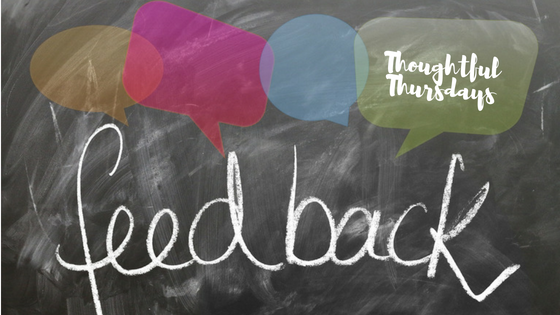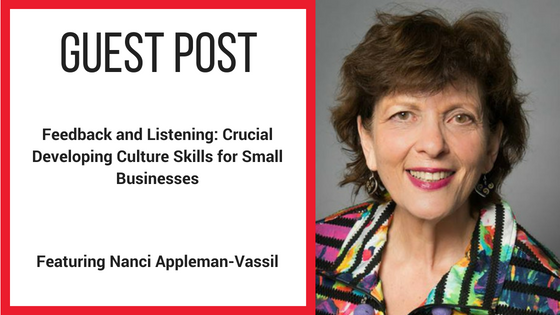Guest Post | Feedback and Listening: Crucial Developing Culture Skills for Small Businesses
June 14, 2018 Today we have Nanci Appleman-Vassil the President and Chief Learning officer at APLS Group on the blog. She’s sharing with us her tips for feedback and listening and how to build an effective company culture – especially as a small business owner. Regardless of the size or age of your business, every company has a company culture – are you intentionally creating yours or leaving it to happenstance? Read more below!
Today we have Nanci Appleman-Vassil the President and Chief Learning officer at APLS Group on the blog. She’s sharing with us her tips for feedback and listening and how to build an effective company culture – especially as a small business owner. Regardless of the size or age of your business, every company has a company culture – are you intentionally creating yours or leaving it to happenstance? Read more below!
Does this sound like you? You are building a successful small business and your mind is consumed with daily thoughts of product, services, locations, cash flow and customers. Small business owners do not typically spend much time pondering the merits of developing an effective company culture which includes delivery of on-going feedback and active listening skills.
Whether intentionally created or left to happenstance, company culture surfaces in all organizations, regardless of size. Smart organizations demonstrate that spending time developing an effective company culture pays huge dividends. In a 2013 article on corporate culture in Harvard Business Review, John Coleman writes that there are six components that contribute to creating a great corporate culture. These same components are viable for small businesses:
- Vision: Create a core statement that reflects the values and purpose of the company.
- Values: Build guidelines for behavioral expectations and adherence by employees.
- Practices: Make values visible in company practices at every level.
- People: Recruit based on the fit between the applicants and the core values of the company.
- Narrative: Develop a distinctive story that tells your history and gives credence to your purpose.
- Place: Construct a physical environment that supports company values and purpose.
Feedback and Listening are crucial components in Developing a GREAT Company Culture. What comes to mind when you hear the word feedback or listening? Does the mention of one of these words make the hairs on the back of your neck feel prickly? Do you think of feedback as business speak for unbridled criticism that annoys you and undermines your confidence? Do you think its overrated and who has time to listen?
I have learned from working in organizations over the past twenty-five plus years that feedback is a word nobody wants to hear. Why because people associate it with “I’ve done something wrong time”. I’d like to suggest a mind shift for you to consider — Feedback and Listening are gifts that you can easily add to your toolkit! You might be wondering how……
Early on in my career, I had the pleasure of working at the National Training Laboratories for the Behavioral Sciences (now known as NTL Institute), a pioneer in the business of training and development with the focus on learning more about your own behavior and how it impacts others. Feedback was an integral part of the day-to-day operation at NTL, as well as a constant activity in the various training sessions we offered. I learned to embrace the lessons that feedback provided because whether the feedback was positive or something they wanted you to do differently, someone was taking the time to share valuable information with me because they cared and wanted me to succeed.
Feedback is more than telling people what is wrong with their performance. Feedback is also communicating to a person what you value and appreciate about them and their contributions. Feedback is a helping tool that can provide the catalyst to improve personal and professional performance. Feedback gets a bad rap because more times is used not in the most helpful way. There are many Best Practice lists about Giving and Receiving Feedback on the Internet. Here are some NAVisms (Nanci Appleman-Vassil isms) of what I share in workshops and how I approach this skill in life:
- What: Be specific. Give examples to support your comments. People may not understand what they’re doing without clear examples.
- When: Timing matters. Give feedback as soon as possible — in the moment if appropriate, or as soon as you can speak to the person privately.
- Why: Explain the consequences of the behavior — that is, what is happening, or how are others being affected, by the behavior.
- How: Critique the behavior, not the person. No one wants to feel attacked.
- Who: To whom can you give feedback? Anyone, so long as you approach it diplomatically and in the spirit of improvement.
What part does Listening play in all this? Why can Listening to feedback be a challenge? As human beings, we are horrible, horrible, horrible listeners! We are wired to react within seconds when someone speaks (currently 8-12 seconds). We do this by either listening because you had me at hello or preparing my opposite point of view or disengaging because I’m not interested. Another factor that comes into play here is that the Brain can take in 600-800 words a minute and most people speak between 150-250 words per minutes. The result? Our brain is looking for something to do!
There are many external and internal barriers to listening that we need to manage to increase our Listening skills. Some may be easier than others –some examples are: noise, visual distractions, the setting, boredom, close-mindedness, and the person speaking. There are signs that a person is not listening effectively. Some of those include continuing to use their laptop or smartphone while the speaker is talking or brings up things already mentioned or discussed
As mentioned with Giving and Receiving Feedback, there are also many Best Practices Listening lists on the Internet. Here are some NAVisms (Nanci Appleman-Vassil isms) of what I share in workshops and how I approach this skill in life:
- Listen to understand and learn, rather than defend or debate
- Make eye contact with the person speaking
- Wait to respond until after the person has finished his or her thought
- Check for understanding by summarizing what you heard and asking questions
- Avoid Multitasking
As the blog title suggests, the skills of Feedback and Listening are crucial skills (also known as gifts) we need to give to ourselves and others. The gift of feedback is in the giving. So the next time someone in your organization or one of your clients suggests a “feedback session” as part of a meeting or activity, embrace the process and actively listen! And remember for Listening, there is a reason you have 2 ears and 1 mouth, you are supposed to listen more and talk less!
You can add these skills to your “toolkit” for greater effectiveness and watch your Company Culture expand to greatness!
About the author
Nanci is a highly successful business owner and Certified Speaking Professional® with more than 25 years of experience delivering training, organizational development, executive coaching, and corporate consulting interventions with a focus on change management, developing leaders and managers, and building high-performing teams. She specializes in facilitating individuals, groups, and organizations toward better solutions for increased engagement and effectiveness. An accomplished author, Nanci recently released the book 18 Common Mistakes Small Business Owners Make, and she contributed chapters to Public Speaking Secrets and GPS for Success. You can find APLS Group on Facebook, Twitter, or LinkedIn.
Related Posts:
Categorised in: Guest Blogs, Thoughtful Thursdays










